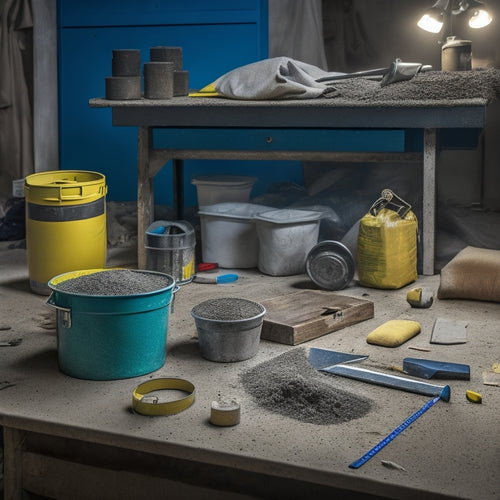
Top Concrete Filling Tools for Commercial Projects
Share
When tackling commercial concrete projects, you need the right tools to guarantee success and longevity. Crack injection equipment, such as epoxy and polyurethane systems, are vital for effective repairs. Grout pumps, available in pneumatic and hydraulic options, efficiently handle high-volume fills. Handheld patching tools, like trowels and putty knives, are necessary for quick repairs. Advanced drilling systems, including diamond core and rotary hammer systems, provide accuracy and power. Finally, precision sealant application gun systems assure consistent results. By understanding the capabilities and limitations of these top concrete filling tools, you'll be able to select the right ones for your project, and that's just the starting point for achieving superior results.
Key Takeaways
• For high-volume fills, reliable grout pumps like pneumatic or hydraulic pumps are essential for efficient handling and consistent results.
• Advanced drilling systems like diamond core drilling and rotary hammer drilling provide accuracy and power for complex commercial projects.
• Handheld concrete patching tools like trowels and putty knives are necessary for quick repairs and professional results in concrete.
• Sealant application gun systems offer precise control over flow rate, pressure, and volume for consistent results in sealant and adhesive application.
• Crack injection equipment selection is crucial, with epoxy injection for narrow cracks and polyurethane foam for wider cracks and high water flow.
Crack Injection Equipment Options
When addressing cracks in commercial concrete structures, you'll need to select the right crack injection equipment options to guarantee a successful repair, as the wrong choice can lead to ineffective bonding and further damage.
To achieve ideal results, consider the type of crack, its width, and the surrounding environment. For narrow cracks, epoxy injection techniques are often the best solution, as they provide a strong, flexible bond.
On the other hand, polyurethane foam applications are better suited for wider cracks or those with high water flow, as they expand to fill the voids and provide a watertight seal.
It's essential to choose the correct equipment and materials to secure a successful repair. Additionally, consider the pressure and flow rate required for the specific application, as well as the type of injection ports and accessories needed.
Grout Pumps for High-Volume Fills
You'll need a reliable grout pump to efficiently handle high-volume fills in commercial concrete projects, especially when working with large areas or deep voids that require significant amounts of grout.
When selecting a grout pump, consider the type of project and the volume of grout needed. There are two main grout pump types: pneumatic and hydraulic. Pneumatic grout pumps are suitable for smaller projects, while hydraulic pumps can handle larger volumes and higher pressures.
In addition to the pump type, your grout mixing techniques play a vital role in achieving the best results. Make sure you're using the correct mix design and following recommended mixing procedures to prevent segregation and guarantee a consistent flow.
Proper mixing also helps to minimize air entrainment, which can lead to reduced pump performance and poor grout quality.
Handheld Concrete Patching Tools
Your handheld concrete patching tools are essential for making quick repairs to cracks, holes, and other defects in commercial concrete surfaces. These tools allow you to apply patching compounds with precision and control, ensuring a strong and durable bond. To achieve professional results, it's imperative to master various patching techniques, such as feather-edging and layering.
| Tool | Description |
|---|---|
| Trowel | Ideal for applying and smoothing patching compounds |
| Putty Knife | Perfect for scraping and cleaning surfaces before application |
| Edger | Used to create a clean, feathered edge around the repair area |
Proper tool maintenance is also important to extend the lifespan of your handheld concrete patching tools. Regularly clean and dry your tools to prevent rust and corrosion. Additionally, store them in a protective case or container to prevent damage. By combining the right tools with expert patching techniques and tool maintenance, you'll be able to deliver high-quality repairs that meet the demands of commercial projects.
Advanced Concrete Drilling Systems
Six advanced concrete drilling systems are now available to tackle complex commercial projects, offering improved precision, speed, and versatility.
These systems are designed to handle demanding tasks with ease. For instance, diamond core drilling systems provide accurate and clean holes in concrete, making them ideal for applications that require precise drilling. Meanwhile, rotary hammer drilling systems deliver exceptional power and speed, making them perfect for large-scale projects that require rapid drilling.
When working with advanced concrete drilling systems, you'll appreciate the improved ergonomics and reduced vibration, which minimize operator fatigue. Additionally, these systems often feature advanced dust collection systems, reducing mess and promoting a safer working environment.
With advanced concrete drilling systems, you'll be able to tackle complex projects with confidence, knowing that you have the right tools for the job. Whether you're working on a large commercial building or an infrastructure project, these systems will help you get the job done efficiently and effectively.
Sealant Application Gun Systems
When tackling complex commercial projects, sealant application gun systems prove vital for efficiently dispensing sealants and adhesives with precision and accuracy. These systems allow you to control the flow rate, pressure, and volume of sealants, guaranteeing consistent results. With various sealant types and application techniques, it's essential to choose the right gun system for your project.
Here's a comparison of popular sealant application gun systems:
| System | Key Features |
|---|---|
| Manual Gun | Economical, simple design, suitable for small-scale projects |
| Pneumatic Gun | High-pressure output, ideal for large-scale projects, and high-viscosity sealants |
| Electric Gun | Consistent flow rate, easy to use, and suitable for most commercial projects |
| Battery-Powered Gun | Portable, convenient, and suitable for remote or hard-to-reach areas |
| Accessories (tips, nozzles, etc.) | Customize your gun system for specific application techniques and sealant types |
When selecting a sealant application gun system, consider the project's requirements, sealant types, and application techniques. By doing so, you'll guarantee efficient and accurate sealant dispensing, resulting in high-quality finishes and successful commercial projects.
Frequently Asked Questions
What Safety Precautions Should Be Taken When Working With Concrete Filling Tools?
When working with concrete filling tools, you should prioritize safety above all. You must wear proper safety gear, including gloves, safety glasses, and a dust mask to prevent exposure to harmful particles.
Additionally, consider environmental considerations, making certain you're working in a well-ventilated area and disposing of waste materials responsibly.
Can I Use Concrete Filling Tools for Residential Projects as Well?
You can definitely utilize concrete filling tools for residential applications, leveraging their versatility to tackle various projects.
Since these tools are designed for heavy-duty commercial use, they can easily handle smaller-scale residential tasks.
You'll find that the same tools used for commercial projects can efficiently fill cracks, repair damaged concrete, and restore surfaces in homes, apartments, and other residential spaces, making them a valuable addition to your toolkit.
How Do I Clean and Maintain Concrete Filling Equipment?
You'll want to develop a regular cleaning routine to maximize equipment longevity.
Start by disconnecting hoses and nozzles, then soak them in a mild detergent solution. Use a soft-bristled brush to remove dried concrete residue.
For more stubborn buildup, try using a wire brush or sandpaper. After cleaning, thoroughly rinse and dry all components to prevent rust or corrosion.
Are Concrete Filling Tools Suitable for Filling Large Voids or Holes?
When tackling large voids or holes, you'll need specialized void filling techniques and large hole solutions.
Concrete filling tools can be suitable, but it's crucial to choose the right equipment and materials for the job.
Consider the size and shape of the void, as well as the surrounding concrete's structural integrity.
With the correct approach, you'll be able to effectively fill large holes and restore the concrete's strength and stability.
What Is the Average Cost of Concrete Filling Tools for Commercial Projects?
You're likely wondering about the average cost of concrete filling tools for commercial projects.
When researching, you'll find that prices vary depending on the concrete tool brands and their features. A cost comparison is essential to find the best value.
On average, you can expect to pay between $500 and $5,000 for a high-quality concrete filling tool, with top brands like Husqvarna and Makita falling in the higher end of that range.
Conclusion
As you stand on the commercial project site, surrounded by the hum of machinery and the scent of freshly poured concrete, the right tools can make all the difference.
On one hand, you're faced with the intimidating task of filling cracks and crevices, a tedious and time-consuming process.
On the other hand, with high-quality concrete filling tools, you're empowered to tackle even the most complex jobs with ease and precision, transforming a site from worn to wonderful.
Related Posts
-

What Tools Do I Need for Concrete Wall Repair
As you prepare for a concrete wall repair job, you'll need a variety of tools to guarantee a successful outcome. Star...
-

7 Best Tools for Concrete Block Construction
You'll need a solid foundation, precise cutting, and seamless finishing to guarantee your concrete block construction...
-

Top Mixing Tools for DIY Concrete Block Laying
When it comes to DIY concrete block laying, the right mixing tools are vital for a strong and durable structure. You'...


